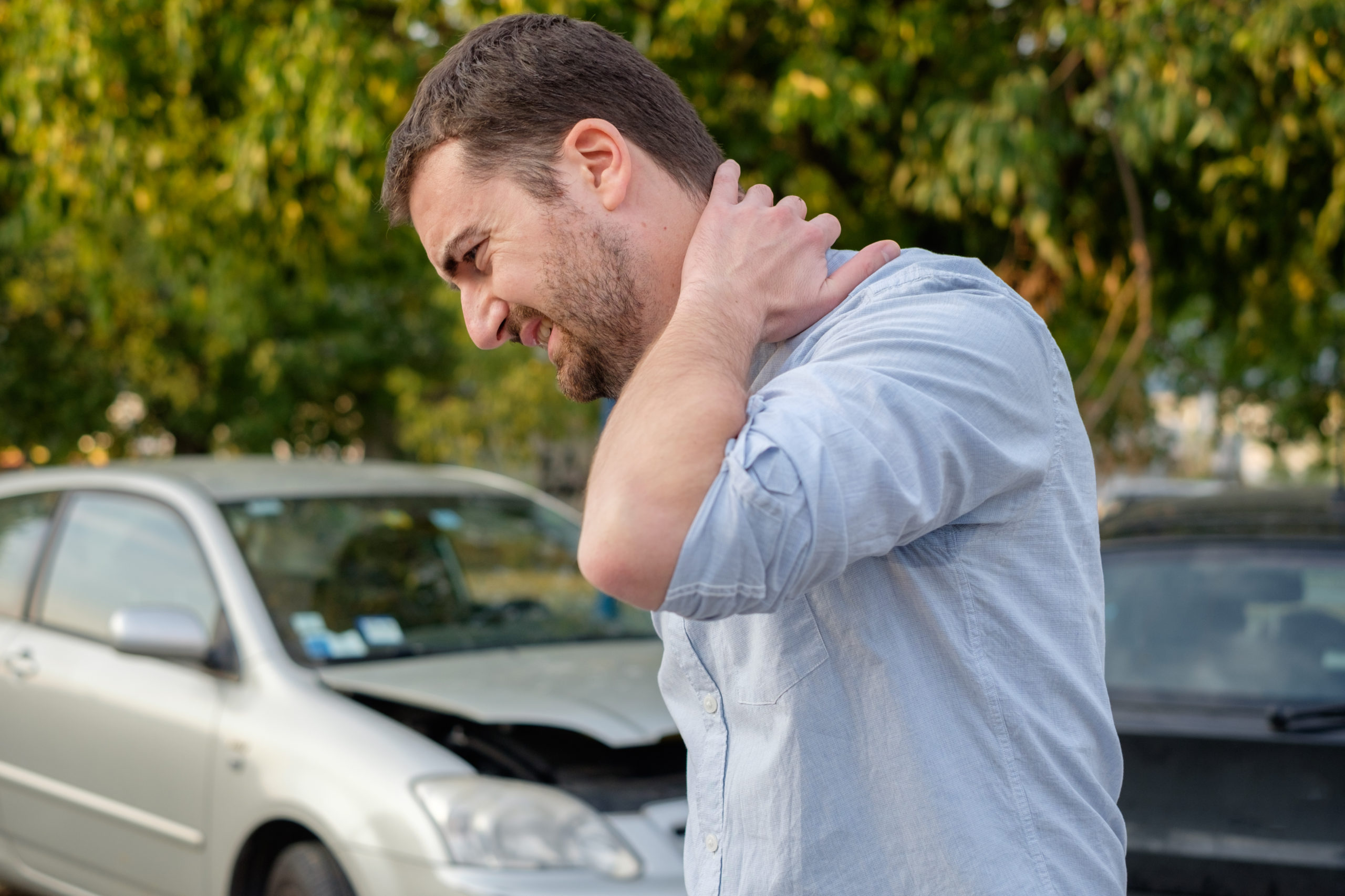Depending on the crash, car accident victims can suffer from a range of injuries ranging from minor aches to serious, life-threatening injuries. However, not all injuries appear right away. Some injuries may not appear until days, weeks, or even months after the accident.
When a crash happens, victims usually look for the obvious signs of visible injury including cuts and bruises or broken bones. However, after an accident, victims often experience an adrenaline rush, which can significantly increase the body’s pain threshold. This rush can last a few hours or even days after the accident. As a result, some victims may not even realize they are injured and may have to deal with delayed pain after the car accident.
That’s why if you were injured in a car accident, it’s important to seek proper medical evaluation. Even if you do not recognize immediate signs of injury, a medical professional can provide a full diagnosis to determine treatment options for any accident-related injuries.
What to Expect After Your Car Accident?
Regardless of the severity of the accident, car accident victims are likely to experience physical pain after a crash. In serious accidents, injured victims can sustain catastrophic car accident injuries that can take months or even years to fully recover. Sadly, some victims never fully recover and must live with a disability for the rest of their lives.
There are various ways of getting injured in a car crash. Some of the most common include:
- Getting thrown back and forth
- Hitting the car dashboard after impact
- Being ejected from the vehicle
- Hitting the windshield or windows
- Getting hit by loose objects, flying debris, or other items
As mentioned earlier, car accident victims often experience an adrenaline rush immediately after a crash. This happens when your body experiences stress and the body prepare you for a fight or flight response.
Here are some ways you might feel after an adrenaline rush following a car accident:
- More energized
- Reduced or absence of physical pain
- Increased flow of oxygen from dilated airways or blood vessels
- Increased strength due to additional blood flow to your muscles
- Impact on your vision or hearing
It’s also normal to feel overwhelmed after a crash. Everyone responds to trauma and stress differently including any physical, emotional, or mental experiences.
What Symptoms Should You Look Out for After a Car Accident?
Each accident is different and so are the symptoms each person experiences afterward. After a crash, you should keep an eye out for physical and mental symptoms that might not appear immediately but can develop hours or days after.
Some common symptoms you should look out for after a car accident include:
- Neck pain or stiffness – Victims often experience neck stiffness or pain after a whiplash, or during rear-end crashes. On impact, the head and neck whip back and forth which results in a sprain or strained neck, herniated disc, or other spinal cord injuries. Pain may appear immediately or not how up for days, weeks, or months later. Permanent injury is also possible.
- Back or shoulder pain – Back or shoulder pain is a common problem following a car crash and can leave victims with limited mobility. Injury to the back or shoulder can result from a herniated disc, soft tissue damage, whiplash, or spinal injury. This can impact the victim’s ability to engage in everyday activities in both their personal and work life.
- Abdominal pain – Stomach pain can indicate soft tissue damage including injury to the internal organs or internal
- Numbness or a tingling sensation – If you feel like pins and needles all over your body, it could be a sign something is wrong with your nervous system. Tingling or numbness could be a sign of brain injury so it’s important to seek medical attention as soon as possible for a full diagnosis.
- Memory loss or difficulty concentrating – if you have trouble remembering things or concentrating over time after an accident, this can be a sign of an emotional or psychological problem.
- Headaches or nausea – Although victims commonly experience headaches or nausea after a car crash, it shouldn’t be dismissed very easily as just another minor injury. Constant headaches could indicate a more serious injury such as a blood clot in the brain or a severe concussion. If you hit your head in an accident, make sure you seek emergency medical attention right away.
- Exhaustion – After getting into a car accident, many victims often feel extremely tired or sleepy. When your body is trying to recover, you may have less energy. If the feeling of exhaustion doesn’t go away, you might have symptoms of depression.
- Blurred vision or dizziness – Changes in vision or feeling light-headed after a car accident shouldn’t be taken lightly. If it feels like your head is moving in circles causing you to lose balance, it could be a sign of a TBI or concussion. Head injuries can impact how your brain communicates with the rest of your body causing you to feel an imbalance.
- Swelling – After a crash, swelling is very common. Victims can experience swelling from damaged tissues, sprains, pulled muscles, and more.
- Reduced range of motion – There could be various reasons why car accident victims could experience a limited range of motion including swollen tissues around the joint. If you feel any pain or stiffness in the muscles around a joint, it might be a good idea to seek medical care.
- Behavioral changes – Traumatic brain injuries can have unpredictable impacts on how someone behaves. Severe concussions can result in mood changes, anxiety, depression, and post-traumatic stress disorder (PTSD).
What Could Cause Delayed Pain After a Car Accident?
There are several factors that might cause delayed symptoms after a car accident including adrenaline, shock, and inflammation. Here’s what you should know:
Adrenaline
One of the main reasons why you might not experience pain immediately following a crash is due to the rush of adrenaline. Also referred to as epinephrine, adrenaline dilates the pupils, increases the production of sweat, and increases your heart rate. But one of the most important functions of this hormone is to block the recognition of pain. While adrenaline doesn’t take the pain away, it does distract you from immediate painful sensations.
It is common for car accident victims to not feel pain or the full extent of their injuries for a couple of hours or even days. However, once the adrenaline in the bloodstream returns to a normal level, the victim will start to feel the full extent of the physical harm caused by the accident.
Shock
Sometimes victims experience a psychological response known as shock after a crash. During a physical shock, the victim’s blood flow is restricted to their vital organs. When this happens, victims may lose feeling in their hands or feet.
Psychologically, the victim may feel a mental disconnect from the current situation. When this happens, the victim won’t be able to fully comprehend the severity of the accident or injury until much later.
Inflammation
In addition to adrenaline and shock, car accident victims may also experience inflammation which can cause delayed pain after an accident. Once adrenaline and shock wear off, your body will start to respond to the physical harm by swelling. Swelling helps protects the body by increasing blood flow to the injured area and helps your body alert you to the pain. Victims may experience swelling from various tissue damage, sprains, and pulled muscles from the site of injury. Some may feel inflammation even before feeling warmth or seeing redness on the injured site.
How Long After a Car Accident Can Pain and Injuries Show Up?
Sometimes injuries show up immediately after a crash. Minor injuries such as cuts and bruises usually can be seen right away. Other times, pain and injuries are delayed. These more serious injuries happen under the skin’s surface and may not show up for days or weeks after the accident. For example, torn muscles or traumatic brain injuries (TBI) may not appear immediately after an accident but might appear a week or two after the crash.
What Should You Do If Your Pain Was Delayed?
After a car accident, it’s important to seek medical attention as soon as possible, even if you don’t feel pain right away. A medical professional can provide a full diagnosis and treat the source of your delayed pain. Without prompt medical care, your injuries may worsen over time.
Additionally, if you don’t seek medical care within a few days or weeks after an accident, it will be more difficult to prove to the insurance company that your injury was the direct result of a crash. If you were injured, you will still need medical treatment or surgery but may have to pay out of pocket. Even worse, you might have a long battle against the insurance company to pay for any accident-related expenses. Keep in mind that the longer you wait to seek medical attention, the more challenging it will be to prove your personal injury case.
Don’t Ignore Minor Aches and Pains
After a car crash, some victims make the mistake of ignoring minor aches, pains, or irregular feelings. Whenever you feel any type of ache or pain, you should make an appointment so a medical professional can give you a proper diagnosis. Don’t make the mistake of thinking that it’s just a minor head or back pain that will go away on its own.
Some mild injuries can indicate that more serious medical attention is necessary. For example, minor neck pain could be a sign of a more serious injury such as a pinched nerve, herniated disc, or whiplash. Minor lower back pain could be a sign of a pinched nerve or joint injury. It could be a sign of a herniated disc. Minor headaches could be a sign of a more serious injury including a concussion, whiplash, or soft tissue strain.
In the most serious scenarios, accident-related injuries could be life-threatening. If you were injured in a car crash, it’s better to seek medical attention as soon as possible for any pain rather than waiting to treat a possibly serious injury. Keep in mind that the statute of limitations for personal injury cases in California is two years. This means that car accident victims only have two years from the date of the accident to file a claim for damages. After the deadline has passed, victims will no longer have the right to seek financial compensation, regardless of the severity of their injuries.
Can You Still Receive Compensation for Delayed Injuries?
While it’s normal for an injured party to sign a release of liability form after settling a car accident claim with their insurance company, it’s best to first speak with an experienced car accident attorney. Even if the insurance company agrees to pay for new medical bills, you don’t want to give up your right to file a lawsuit in case your injuries get worse. Sometimes, it’s better to file a lawsuit to make sure you receive fair compensation for the full extent of your injuries. Additionally, this is also why it is important for individuals who are experiencing car accident pain to seek a full medical diagnosis after a crash.
What Kind of Injuries Have Delayed Onset or Get Worse Over Time?
While injuries show up immediately, others take time to appear. Some common injuries with delayed symptoms include:
- Whiplash – This injury can happen upon the impact that forces the neck and skull to move quickly back and forth or sideways. This unexpected motion can affect the head and neck in multiple ways including tears in the muscles, ligaments, tendons, face joints, and nerves. Common symptoms of neck injury include neck pain or stiffness, shoulder pain or swelling, trouble sleeping, dizziness, and headaches.
- Traumatic brain injury (TBI) – There are three general levels of TBI which range from mild, moderate, to severe. Even mild symptoms can go for days, weeks, or months before getting detected. Common symptoms of TBI to look out for include excessive fatigue, memory issues, vision issues, changes in taste or smell, and changes in personality over time.
- Concussions – A traumatic brain injury caused by a hit to the head and causes the brain to move violently inside the skull. Even mild concussions can have long-lasting effects but may not be noticeable until much later.
- Internal bleeding – Since it can’t be seen on the surface, internal bleeding can go unnoticed for many days. Bleeding inside the body is serious and can be deadly if untreated as soon as possible. Odd large bruises, swelling, severe fatigue, or dizziness are common symptoms that could indicate signs of internal bleeding.
- Blood clots – Upon severe impact, excessive internal bleeding can result in blood clots. Blood clots can form anywhere in the body but the most dangerous clots form in the legs. Referred to as deep vein thrombosis (DVT), this condition can cause blood to break and travel to the victim’s lungs where it blocks the pulmonary artery. As a result, the victim can experience chest pains or faintness. Blood clots can also form in the brain, leaving the victim with permanent brain damage. Sadly, blood clots in the brain can even lead to death.
- Back and spinal cord injuries – Back pain after a car accident should not be ignored as it can indicate a serious injury to your muscles, spinal discs, or vertebrae. Spinal cord injuries can leave victims permanently paralyzed. Common symptoms of these types of injuries include neck or lower back pain, soreness or stiffness, limited range of motion, sharp pain when coughing or moving, redness or warmth at the site of injury, pain or tenderness, cramping, muscle spasms, and feelings of numbness or tingling.
- Soft tissue injuries – Common soft tissue injuries after a car accident include sprains (tears in the ligament) and strains (tears in the tendons and muscles).
- Post-traumatic stress disorder (PTSD) – In addition to physical injuries, a car accident can also impact a victim’s mental health. PTSD occurs after a traumatic event such as a car accident. Victims may experience a variety of symptoms such as repeatedly thinking about the accident or having increased levels of anxiety in their everyday life. Unfortunately, PTSD doesn’t go away on its own and will only get worse without help. If you suspect you may have PTSD, it’s best to speak with your doctor about possible treatment options.
Don’t Settle Immediately and Get Help with Your Case
Car accidents can be a very traumatic experience. Whether the injuries are minor or serious, car crash victims are entitled to compensation for their losses. Insurance companies will likely offer victims a low settlement offer to try and close out a claim quickly. But don’t make the mistake of settling too soon or without the help of a car accident attorney.
Mesriani Law Group has over 20 years of experience and an impressive track record of obtaining the maximum compensation for our clients. If you or someone you know has been dealing with delayed pain after a car accident, contact our law office to learn more about your legal options. We accept clients on a contingency basis and do not charge you anything if we do not win your case. Keep in mind that there is a strict deadline for filing personal injury claims so make sure that you start your claim immediately. Contact us today at (866) 500-7070 for a free consultation.
Delayed Pain FAQs
How long will I be sore after a car accident?
Every car accident is different and so will the amount of time your body will need to heal. Generally, car accident victims can expect to feel sore for about six weeks after a crash. Common symptoms after a car crash include minor soreness. Neck and back pain are also frequently experienced.
Is it normal to hurt after a car accident?
Feeling hurt or sore after a car accident is normal. Even in a minor accident, victims often experience feeling sore for several weeks. The impact of a crash can seriously damage the body’s soft tissues. Muscle pain is often commonly the result of soft tissue injuries such as whiplash, strains, and sprains. Keep in mind some victims must also deal with delayed symptoms after a car accident which may not appear until days or weeks following a crash.








